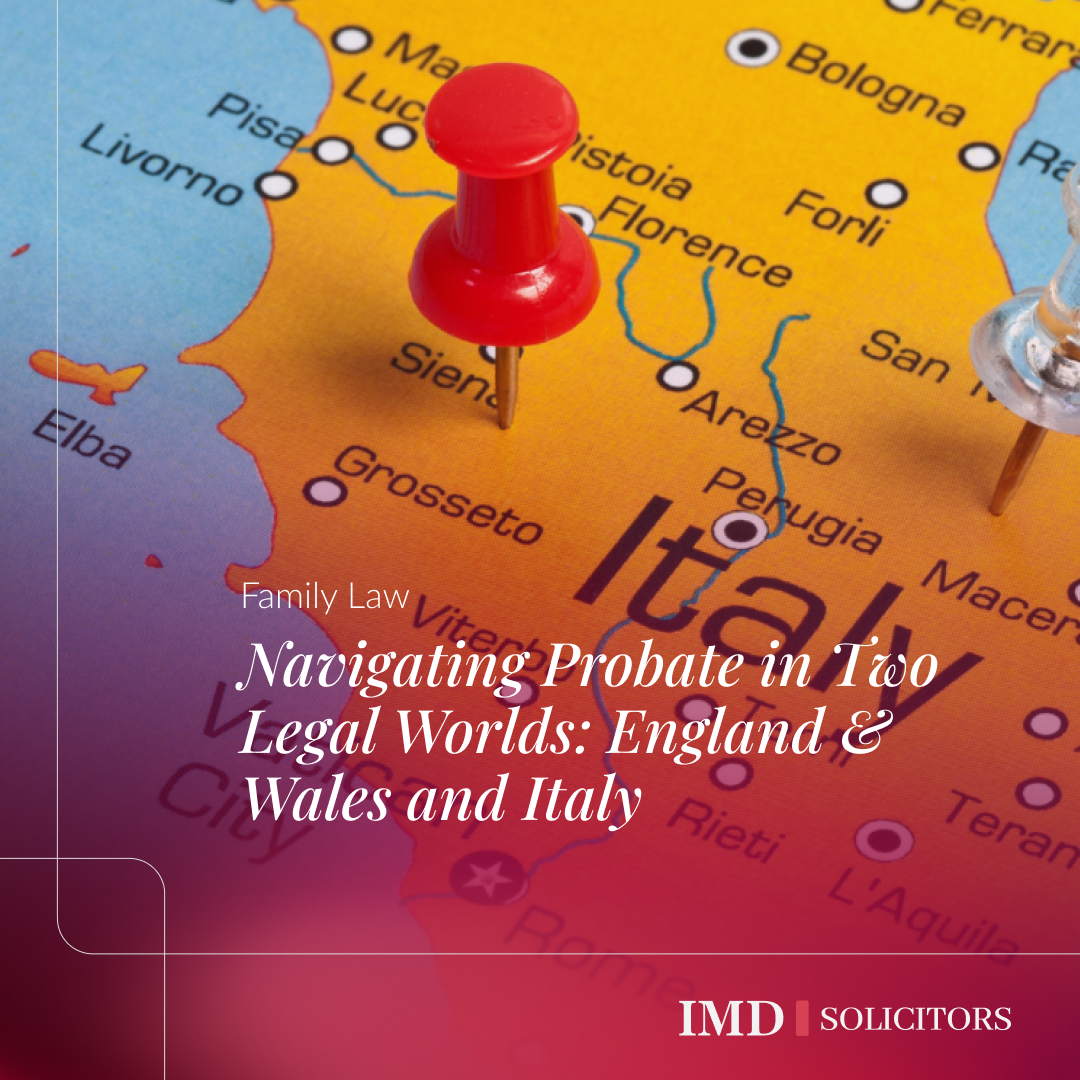Navigating Probate in Two Legal Worlds: England & Wales and Italy

Speak to a member of our specialist international team of UK family lawyers today on 0330 107 0107.
When someone passes away, the legal process of handling their estate can be complex—especially when it crosses borders. As a dual-qualified Solicitor and Avvocato, I often support clients who are navigating estates involving both England & Wales and Italy. Despite some surface similarities, the probate processes in these two jurisdictions are fundamentally different, rooted in contrasting legal traditions, expectations, and systems of inheritance.
Understanding how each country approaches succession is essential not only for executors and heirs, but also for those planning ahead to ensure their wishes are respected across jurisdictions.
Two Systems, Two Starting Points
The first key difference lies in the legal frameworks themselves.
- England & Wales follows the common law tradition, which emphasises formal procedures and court involvement. Probate is a central part of the administration process and must be formally obtained through the Probate Registry.
- Italy, by contrast, operates under a civil law system. The concept of “probate” as known in the UK simply does not exist. Instead, heirs automatically inherit rights and responsibilities upon death. There is no need to apply for court approval to begin managing the estate, but heirs must file a declaration of succession (dichiarazione di successione).
Executors vs. Heirs: Who Takes Responsibility?
In England & Wales, executors named in the will—or administrators if there is no will—apply for a Grant of Probate or Letters of Administration. They act as legal representatives of the estate.
In Italy, there is no direct equivalent of an executor. The heirs themselves step into the shoes of the deceased, becoming responsible for managing and distributing the estate. Importantly, heirs can:
- Accept the inheritance outright (accettazione pura e semplice), which includes liabilities.
- Accept “with the benefit of inventory” (con beneficio di inventario), which protects them from personal liability for debts.
Italian clients often ask: “If I inherit in England, do I also become responsible for debts?”
The answer is no: UK executors deal with debts on behalf of the estate. In Italy, however, heirs who accept outright do become liable, which is why the benefit of inventory is so important.
Formalities and Court Involvement
- England & Wales: Probate requires formal steps—registering the death, valuing the estate, completing inheritance tax forms, and applying to the Probate Registry. Only once probate is granted can assets be collected, debts settled, and distributions made.
- Italy: The process is primarily administrative. Heirs must file the dichiarazione di successione within 12 months, register the death locally, and update the land registry if property is involved. Often, a notary (notaio) is required to prepare deeds.
Common question: “Do I need to go to court in Italy like in England?”
Not usually, unless disputes arise. In Italy, much of the process runs through administrative offices and notaries rather than the courts.
Testamentary Freedom vs. Forced Heirship
This is one of the starkest contrasts between the two systems.
- England & Wales allows near-complete testamentary freedom. Individuals can generally leave their estate to whomever they wish. Although certain dependants may challenge under the Inheritance Act 1975, this is the exception rather than the rule.
- Italy, however, enforces forced heirship (successione necessaria), which reserves fixed shares of the estate for close family members such as children and spouses. Even if a will excludes them, the law overrides it.
Italian clients often ask: “Can I disinherit my children if I make an English will?”
In Italy, usually not as the children retain their reserved quota. In England & Wales, yes, in principle, though claims can sometimes be made by dependants.
Cross-Border Considerations
When an estate spans both jurisdictions, the complications multiply:
- A will valid in one country may not be fully effective in the other. For example, Italian real estate must comply with local formalities regardless of what a foreign will says.
- Tax exposure may arise in both countries. Although the UK and Italy have a double taxation treaty, reliefs must be properly claimed.
Clients often ask:
- “Should I make two wills, one for each country?” (Often advisable, if carefully coordinated to avoid conflicts.)
- “Will my UK will cover my Italian property?” (Not necessarily, as local rules may override it.)
- “How can I avoid double taxation?” (Through careful planning and coordination of inheritance tax filings.
Final Thoughts
Probate in England & Wales and succession in Italy are guided by very different principles, processes, and expectations. Navigating both systems requires not only legal knowledge but also cultural sensitivity and practical experience.
If you are facing the challenge of a cross-border estate or wish to ensure your succession planning is effective in both jurisdictions, feel free to get in touch. I’d be happy to help you bring clarity and peace of mind to what can otherwise be a complex and emotional journey.
This article is for general information only and does not constitute legal or professional advice. Please note that the law may have changed since this article was published.



















